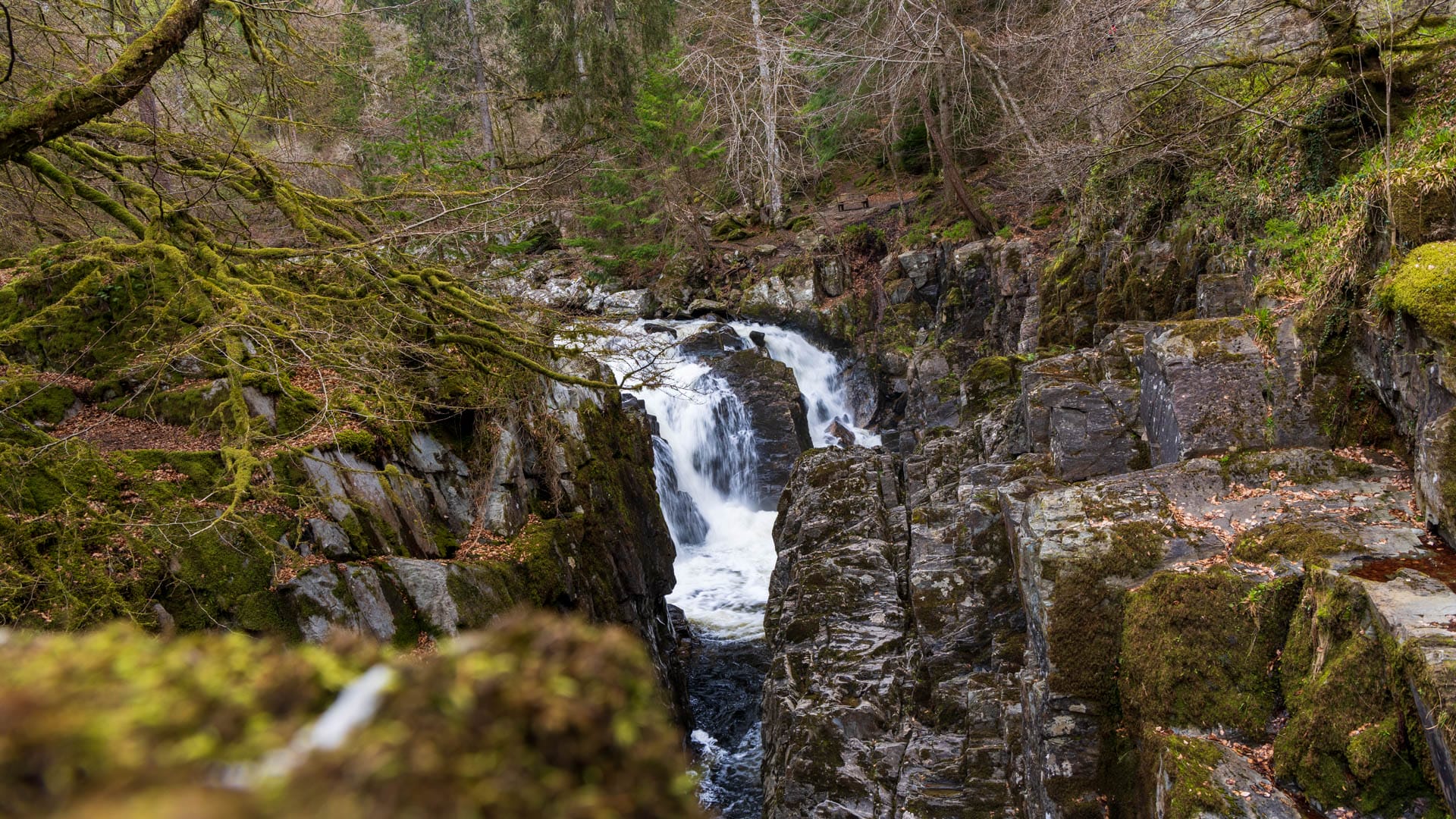A walk in the woods to waterfalls, the Hall of Poets and a cave for hermits. The Hermitage shows why Perthshire is also known as “Big Tree Country”.

Deep in the forest, the River Braan thunders down the rocks and then eats its way through a dark gorge. It spans a stone bridge in a high arch, with a small hall towering above it all. This is the romantic scene that awaits visitors to The Hermitage at Dunkeld.
The Dukes of Atholl were also romantically influenced in the 18th century. The works of Ossian, supposedly an ancient Celtic bard who sang of the legendary King Fingal, were popular in Scotland at the time. Although these stories turned out to be pure invention, the enthusiasm for Ossian and Fingal would not die down.
The Dukes of Atholl began to dedicate the square by the waterfall to the mythical bard. That is why they built Ossian’s Hall of Mirrors on a rocky outcrop. They had mirrors installed inside. The effect: anyone standing in the hall believed that water was flowing all around them. An impressive illusion at the time, which unfortunately can no longer be experienced in the hall today. The current structure was only built in the 20th century after vandals destroyed the old hall.
The entire property on which the forest grows belonged to Dunkeld House, where the Dukes resided and could entertain guests. And of course they had to offer something in return. In addition to the waterfall and Ossian’s Hall, this also included Ossian’s Cave. This stone-built hut also dates back to the 18th century.
Back then, it was probably fashionable for rich aristocrats to have a hermit living on their property. Visitors could then visit and marvel at him while walking in the forest. The Dukes had the hermitage built and looked for someone to live there – for money. However, nobody wanted to take on the job. And so sometimes guides dressed up with lichen as beards and furs as clothes and waited at the hut for the fine gentlemen.
The name of the area “The Hermitage” also comes from this hermitage. The forest here is actually called Craigvinean Forest. And even without the buildings and the waterfall, it would be impressive. Douglas fir trees have been growing here for decades, sometimes even centuries. Many over 50 metres high. They honour the nickname of the Perthshire region: “Big Tree Country”.
Today, it is no longer aristocrats who stroll here. In 1943, the then Duchess of Atholl handed the area over to the National Trust for Scotland. In 2007, the Trust renovated Ossian’s Hall. Since then, the forest has been a popular excursion destination for locals too.
For travellers heading north on the A9 to Inverness, The Hermitage offers a relaxing break from driving. Depending on which route you take, the path to the waterfall is between 600 metres and 1 kilometre long. A few hundred metres further on is Ossian’s Cave. If you prefer a longer walk, you can also take a hike of 2.5 hours or more. In any case, sturdy footwear is recommended.
Knowledge: The money in the trees
There are a few felled trees along the way. The strange thing is that their stumps are littered with coins.
This tradition goes back to the “Wish Trees”. According to superstition, hammering a coin into the bark is supposed to fulfil a quietly expressed wish. This romantic idea goes back at least as far as the 19th century before it died out. In recent years, however, more and more of these wish trees have reappeared. Now so often that it is starting to become harmful.
This is because coins in living trees release chemicals over time that damage these trees. And they also harm nature in tree stumps. Not only can chemicals be released here, they also destroy important feeding grounds for animals. Tree stumps are particularly important for insects, which in turn provide food for many birds.
The NTS asks that this tradition not be pursued and that the money be donated to a charitable organisation instead.
Directions
With satnav: enter “PH8 0JR” and then follow the signs.
Without satnav: The car park for The Hermitage is a short distance west of Dunkeld as you drive up the A9. There is a sign indicating the car park, which is on the left-hand side of the road as seen from this direction.